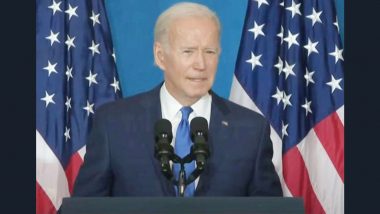Warsaw, February 21: President Joe Biden reaffirmed the United States' dedication to European security as he met with Polish President Andrzej Duda on Tuesday, part of a series of consultations with allies to prepare for an even more complicated stage of Russia's invasion of Ukraine.
“We have to have security in Europe,” he said at the presidential palace in Warsaw. “It's that basic, that simple, that consequential.” Biden described NATO as “maybe the most consequential alliance in history," and he said it's “stronger than its ever been” despite Russian President Vladimir Putin's hopes that it would fracture over the war in Ukraine Joe Biden Makes Surprise Visit to Kyiv to Meet Volodymyr Zelenskyy, Show Solidarity With Ukrainians As Russia-Ukraine War Nears One Year (Watch Video)..
Biden arrived in Warsaw on Monday after paying an unannounced visit to Kyiv. Duda praised Biden's trip as “spectacular,” saying it “boosted morale of Ukraine's defenders." He said the visit was “a sign that the free world, and its biggest leader, the president of the United States, stands by them.” Russia-Ukraine War: US President Joe Biden Visits Volodymyr Zelensky In Kyiv, Says Putin ‘Dead Wrong’.
Biden is slated to deliver a speech on the war later Tuesday, and on Wednesday he plans to meet again with Duda along with other leaders of the Bucharest Nine, a group of the easternmost members of NATO military alliance.
The conflict in Ukraine — the most significant war in Europe since World War II — has already left tens of thousands of people dead, devastated Ukraine's infrastructure system and damaged the global economy.
In his address, Biden is expected to highlight the commitment of Poland and other allies to Ukraine over the past year when he speaks from the gardens of Warsaw's Royal Castle.
Last March, speaking from Warsaw, Biden delivered a forceful and highly personal condemnation of Putin just weeks after the start of the war. White House national security adviser Jake Sullivan said Tuesday's speech would be “vintage Joe Biden" and that the Democratic president would lay out that the action democracies take in the coming years will have reverberations for years to come.
Biden is to speak on the day that Putin was delivering his long-delayed state-of-the-nation address, in which he announced that Moscow would suspend its participation in the last remaining nuclear arms control pact with the United States.
The so-called New START Treaty caps the number of long-range nuclear warheads they can deploy and limits the use of missiles that can carry atomic weapons. Sullivan said that Biden's address would not be “some kind of head to head" with Putin's address.
“This is not a rhetorical contest with anyone else," said. “This is an affirmative statement of values, a vision for what the world we're both trying to build and defend should look like."
While Biden is looking to use his whirlwind trip to Europe as a moment of affirmation for Ukraine and allies, the White House has also emphasized that there is no clear endgame to the war in the near term and the situation on the ground has become increasingly complex.
The administration on Sunday revealed it has new intelligence suggesting that China, which has remained on the sidelines of the conflict, is now considering sending Moscow lethal aid. Secretary of State Antony Blinken said it could become a “serious problem” if Beijing follows through.
Biden and Zelenskyy discussed capabilities that Ukraine needs “to be able to succeed on the battlefield” in the months ahead, Sullivan said. Zelenskyy has been pushing the U.S. and European allies to provide fighter jets and long-range missile systems known as ATACMS — which Biden has declined to provide so far. Sullivan declined to comment on whether there was any movement on the matter during the leaders' talk.
With no end in sight for the war, the anniversary is a critical moment for Biden to try to bolster European unity and reiterate that Putin's invasion was a frontal attack on the post-World War II international order. The White House hopes the president's visit to Kyiv and Warsaw will help bolster American and global resolve.
In the U.S., a poll published last week by The Associated Press-NORC Center for Public Affairs Research shows that support for providing Ukraine with weapons and direct economic assistance is softening.
And earlier this month, 11 House Republicans introduced what they called the “Ukraine fatigue” resolution urging Biden to end military and financial aid to Ukraine, while pushing Ukraine and Russia to come to a peace agreement. Biden dismissed the notion of waning American support during his visit to Kyiv.
“For all the disagreement we have in our Congress on some issues, there is significant agreement on support for Ukraine,” said while in Kyiv. “It's not just about freedom in Ukraine. … It's about freedom of democracy at large.”
Ahead of the trip, the White House spotlighted Poland's efforts to assist Ukraine. More than 1.5 million Ukrainian refugees have settled in Poland since the start of the war and millions more have crossed through Poland on their way to other countries.
Poland has also provided Ukraine with $3.8 billion in military and humanitarian aid, according to the White House. The Biden administration announced last summer that it was establishing a permanent U.S. garrison in Poland, creating an enduring American foothold on NATO's eastern flank.
“The truth of the matter is the United States needs Poland and NATO as much as NATO needs the United States,” Biden told Duda.
(The above story is verified and authored by Press Trust of India (PTI) staff. PTI, India’s premier news agency, employs more than 400 journalists and 500 stringers to cover almost every district and small town in India.. The views appearing in the above post do not reflect the opinions of LatestLY)


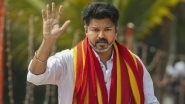

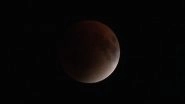

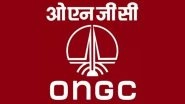



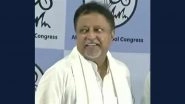


 Quickly
Quickly